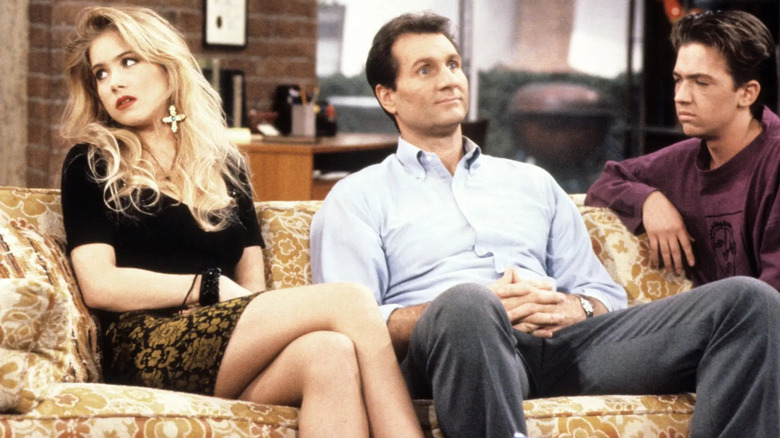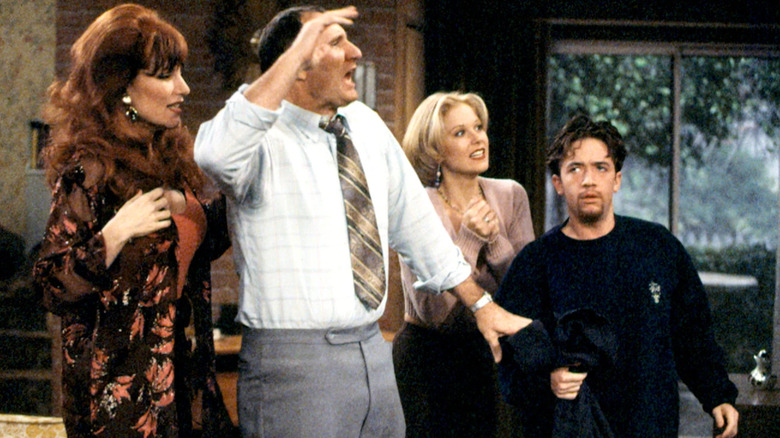How Married With Children Paved The Way For The Simpsons' Massive Success
In 2022, it's quite difficult to explain the deathly tight grip that "Married... with Children" had on American culture. The show, which first aired in 1987, was generally constructed like the 30-some years of sitcoms that came before it. There was a working-class father (Ed O'Neill), a doting mother (Katey Sagal), and a pair of precocious teen kids (Christina Appelgate, David Faustino). They even had a stock "nosy neighbor" (Amanda Bearce). The gag of "Married...," however, was that the characters were all the most awful people you've ever seen. Dad was a slobby misanthrope who hated his family with open disgust, Mom's only survival trait was curt mockery of her slovenly husband, and the kids were various levels of idiotic, each pursuing sex and money with only the dimmest perception of the world around them. What's more, they often celebrated their own shortcomings. They were the below-average, all-American family you loved to hate.
The 1980s was a time when American sitcoms were getting weird. This was a time when a typical suburban home could unexpectedly find itself stocked with a homemade android ("Small Wonder") or a wisecracking space alien ("ALF"). Older, blander "classic" sitcoms — from "Leave it to Beaver" to "The Waltons" to "All in the Family" — had long ago sunk into the mass consciousness and came to define the average American family as something stalwart and safe. By 1987, however, a new generation couldn't take that notion seriously anymore. It was high time for some cultural deconstruction. "Married..." surfed into the late 1980s on a wave of irony, eager to depict the average American family as vindictive, stupid, and cruel.
The cruelty lasted for 11 seasons.
The show that 'pissed a lot of people off'
"Married... with Children," served as satire. It was an elaborate, cynical send-up of sitcoms, unconcerned with pleas for wholesomeness or even common decency. In 1987, audiences loved the show's baked-in rancor, and "Married..." was a huge, huge hit. Its success paved the way for another notable deconstructionist sitcom of the late 1980s that would come to alter pop culture in ways no one could have predicted. Without "Married... with Children," there would be no "The Simpsons."
This sentiment is stated explicitly in the Vice video series "Icons Unearthed," where several of the artists and executives behind the animated, decades-old juggernaut explain how the pop media landscape had to be arranged perfectly so that "The Simpsons" would have a soft place to land. Vice interviewed voice actor Cooper Barnes, and he recalls that "Married..." was "the first, like, really irreverent family sitcom," pointing out that "if every sitcom was shot in front of a live studio audience, 'Married... with Children' was like the show was shot in front of a live strip club audience." The show was not merely based on insult humor, but the audience howled and hooted more than they laughed.
Most notably, as Barnes said, it "pissed a lot of people off." The show launched an infamous hang-wringing campaign from a concerned right-wing busybody named Terry Rakolta, the sister of Ronna Romney, who was once married to Mitt Romney's nephew. As often happens, her crusade to get the show canceled — spearheaded by writing outraged letters to "Married..." sponsors — only galvanized the show's place in the pop consciousness. "That's what made the show popular," Barnes declared. Once entrenched, the door was now open to allow a new type of sitcom into the marketplace.
Enter "The Simpsons."
The bad boys of Fox
Those around at the time will recall how "Married... with Children" and its good/bad reputation bled out into the network at large. Fox, the show's broadcasting network, gladly took on the mantle of the "naughty kids" of the industry. To cash in on their new infamy, the network teamed up with legendary comedy director-producer James L. Brooks, the award-winning executive producer behind "Taxi" and "The Mary Tyler Moore Show," and the Oscar-winning director of "Terms of Endearment" and "Broadcast News." It was Brooks who wanted to do a show starring comedian Tracey Ullman.
As "Simpsons" fans know, the character debuted as animated interstitials on "The Tracey Ullman Show," and it was that show's executive producer Ken Estin who first learned of a little underground comic strip called "Life in Hell," authored by one Matt Groening. Estin said in Vice's "Icons Unearthed" that he loved "Life in Hell":
"I said, 'Gosh, these characters are so weird-looking. They're drawn poorly. They all have overbites for no apparent reason.' They were perfect."
Eventually, the planned "Life in Hell" animated segments mutated into "The Simpsons."
The rest, as they say, is history. If it weren't for all the crass hooting on "Married... with Children" and the Fox network's subsequent willingness to be "edgy" in response, "The Simpsons" may not have ever happened.


